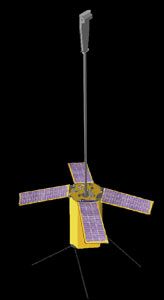Kolibri (original) (raw)

Home - Search - Browse - Alphabetic Index: 0- 1- 2- 3- 4- 5- 6- 7- 8- 9
A- B- C- D- E- F- G- H- I- J- K- L- M- N- O- P- Q- R- S- T- U- V- W- X- Y- Z
Kolibri

Kolibri 2000
Credit: Manufacturer Image
Russian technology satellite. Kolibri was a joint Russian-Australian educational project to allow school children to monitor low frequency waves and particle fluxes in low orbit.
Status: Operational 2002. First Launch: 2002-03-19. Last Launch: 2002-03-19. Number: 1 . Gross mass: 21 kg (46 lb).
The IKI space science group led the project together with Energia, NPO-M and Polyot. The satellite was equipped with a 2-meter gravity gradient boom and four solar panels. The satellite was ejected into orbit from the Progress M1-7 spacecraft after it had undocked from the International Space Station. in a 385 x 388 km x 51.6 deg orbit.
Subtopics
Family: Technology, Technology satellite. Country: Russia. Launch Vehicles: R-7, Soyuz-FG. Launch Sites: Baikonur, Baikonur LC1. Agency: IKI. Bibliography: 2, 4, 552, 554.
2002 March 19 - . 22:28 GMT - . Launch Site: Baikonur. Launch Complex: Baikonur LC1. LV Family: R-7. Launch Vehicle: Soyuz-FG.
- Kolibri - . Mass: 21 kg (46 lb). Nation: Russia. Agency: RAKA. Class: Technology. Type: Navigation technology satellite. Spacecraft: Kolibri. Decay Date: 2002-05-04 . USAF Sat Cat: 27394 . COSPAR: 2001-051C. Apogee: 388 km (241 mi). Perigee: 385 km (239 mi). Inclination: 51.60 deg.
Home - Search - Browse - Alphabetic Index: 0- 1- 2- 3- 4- 5- 6- 7- 8- 9
A- B- C- D- E- F- G- H- I- J- K- L- M- N- O- P- Q- R- S- T- U- V- W- X- Y- Z
© 1997-2019 Mark Wade - Contact
© / Conditions for Use